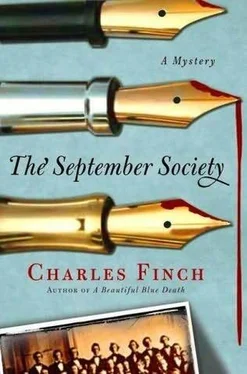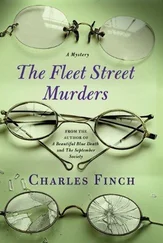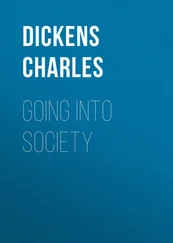Charles Finch - The September Society
Здесь есть возможность читать онлайн «Charles Finch - The September Society» весь текст электронной книги совершенно бесплатно (целиком полную версию без сокращений). В некоторых случаях можно слушать аудио, скачать через торрент в формате fb2 и присутствует краткое содержание. Жанр: Исторический детектив, на английском языке. Описание произведения, (предисловие) а так же отзывы посетителей доступны на портале библиотеки ЛибКат.
- Название:The September Society
- Автор:
- Жанр:
- Год:неизвестен
- ISBN:нет данных
- Рейтинг книги:4 / 5. Голосов: 1
-
Избранное:Добавить в избранное
- Отзывы:
-
Ваша оценка:
- 80
- 1
- 2
- 3
- 4
- 5
The September Society: краткое содержание, описание и аннотация
Предлагаем к чтению аннотацию, описание, краткое содержание или предисловие (зависит от того, что написал сам автор книги «The September Society»). Если вы не нашли необходимую информацию о книге — напишите в комментариях, мы постараемся отыскать её.
The September Society — читать онлайн бесплатно полную книгу (весь текст) целиком
Ниже представлен текст книги, разбитый по страницам. Система сохранения места последней прочитанной страницы, позволяет с удобством читать онлайн бесплатно книгу «The September Society», без необходимости каждый раз заново искать на чём Вы остановились. Поставьте закладку, и сможете в любой момент перейти на страницу, на которой закончили чтение.
Интервал:
Закладка:
(“A silver didrachm of Claudius,” said Hallam authoritatively. He was reckoned to know of such things. “You can all see the uneven cut, as well as Claudius standing in his four-horse chariot. From A.D. 46, would be my guess. One of the rarest early coins.”
“But where shall it be housed?” Hilary asked.
“If the palace will do, I can arrange for its presentation and safekeeping,” said the prince with a noble turn of his head. “It shall come to every meeting.”
Nobody would say otherwise, though Hallam looked slightly crestfallen, and indeed there was much excited talk about a possible SPQR collection-and then a long argument about whether Cambridge or Oxford was a better ultimate location for the hypothetical archive.)
Then there was a motion from Russell to cap the total number of members at any one time at eight, except in the case when a legacy of the seven original members present, or more specifically a son or grandson, had a sufficient interest and knowledge of Roman history to gain admittance to the group.
Now, this was a controversy. A faction comprised of Lenox, Hilary, and Beacham suggested that the number be higher-twelve, say-though with no obligation to reach the cap, because there might well be two deserving candidates to come forth in the future. Russell pointed out that compatibility was as serious an issue as knowledge, and that the group would begin to grow too generic if it got much larger, without the bonds of friendship that they all enjoyed. The prince, Hallam, and Weft all said that they could see both sides of the argument, with Weft leaning toward Russell’s side, Hallam the other way, and the prince refusing to commit. This was all very vexing to Russell, who had expected to sail through the vote unanimously. Eventually, though, he agreed to compromise on the number nine. Everyone conceded that finding three eligible candidates in their lifetimes was unlikely, and so nine became the number. Weft added that they didn’t even have an eligible candidate on the horizon and expressed his doubt that the issue would become problematic anytime soon. Still, it had been a pleasing argument and given them all time for another glass of brandy, and so none of them regretted it.
Lenox gave the closing remarks. These were different each time, and responsibility for them rotated among the men. In general they were meant to pledge the renewal of every man’s friendship with every other. He removed a sheet of paper from the thin brown folder he had brought, and read.
“Gentlemen,” he said, “we come here every two months to celebrate the ancient culture which all of us love. And if I may say so, they are six of the happiest nights of the year for me. I read something of the old texts every day-Virgil, Polybius, Tacitus, Ovid-and I may say that they are common in my life. But it is uncommon to meet with a small group of other people so sympathetic and friendly, so lively and intelligent. It is uncommon that we all feel at ease with each other, in our short interactions together. It is uncommon that we have this felicity in our lives. As Marcus Aurelius pointed out, we are only passing creatures-but happy and fortunate ones. Please raise your glasses with me that these passing hours of our lifetime are so blessed with good spirit and friendship.”
The applause bespoke recognition, somber, affirmative, and genuine. They raised their glasses, their room visible as a small square of light in the late darkness of the city.
CHAPTER FORTY
W ho was Major Peter Wilson, late of the 12th Suffolk W 2nd, cofounder of the September Society, and recently deceased?
The next morning was rainy, too, and after rising late (and slightly foggy-headed), Lenox in his slippers and robe had taken himself to his old thinking post by the fire. Sipping his cup of tea, he pondered Wilson’s strange and superficially senseless death. Wilson must have had a good pension, had certainly had a distinguished career, and enjoyed-theoretically-a group of close friends. The more Lenox thought over the idea of suicide, the more improbable it seemed.
When he finished his breakfast, Lenox donned a blue morning coat and set out to walk the short distance to Park Lane. He had decided to pay another visit to the September Society’s (and Biblius Club’s) talkative doorman.
The rain was thin and driving, bitter, and the buildings along St. James’s Park looked gray and dull, lifeless even where they were dimly lit. A rolling fog had appeared, too. It became denser as Lenox came nearer the Thames, until the streets were almost impenetrable beyond a few feet. When he reached Carlton Gardens and the stout building that housed the two clubs, he found a different, older doorman present.
“Hello there. I was hoping to find Thomas Hallowell here?”
“He’s not on for another half hour, sir.”
“Isn’t he? That’s too bad. Any idea where he might be at the moment?”
“Probably down the pub, sir, having a bite of breakfast.”
“Which one would that be?”
“The Royal Oak, sir, just through that alley.”
“Thanks very much.”
Like so many pubs in England, the Royal Oak was named for the oak tree in Shropshire in which Charles II had hidden from the Commonwealth troops after a key battle in the Civil War. It was an undistinguished pub, with a brass bar, charred wood tables, and low lamps that were always guttering and shifting, casting a sallow light over the dark room. Lenox found Hallowell eating ham and eggs with a mug of coffee at the bar, a vast napkin spread over his chest to avoid disturbing his neatly turned-out suit of clothes. He looked up at the detective when the barman, who had a massive mustache that was wet with beer, asked what Lenox was drinking.
“A half of mild, then,” said Lenox and put his change on the stile.
“Mr. Lenox?” asked Hallowell, looking disconcerted.
“That’s right. Hope you don’t mind my coming to see you.”
“No, not at all-only I don’t know anything else about the murder, or I would have come to see you.”
“Actually I know a bit more, and I was hoping to ask you a question or two.”
The man looked doubtful.
“Nothing to incriminate anybody at either club-only background, you see. We’re all pushing in the same direction, the members of the club and me and you. But you know them. Like their privacy, don’t they?”
He nodded knowingly. “Aye, that’s right.”
“So they might not recognize quickly enough that we’re all on the same side.”
Thomas nodded again, and Lenox knew that he had license to ask his questions. “What I really want to know about is Peter Wilson, Tom.”
“Major Wilson? He was a nice enough old chap-quite military, you know, very orderly and all.”
“Did he get on well with all the others?”
“In the Society?”
“Right.”
“Yes, he seemed to. He was close with a chap named Allen-Lieutenant Allen, we call him.”
“A regular?”
“No-not a regular, exactly, but came in pretty often with the major.”
“Who are the most regular Society members?”
“Oh, there are seven or eight.”
“Major Butler? Captain Lysander?”
“Yes, certainly.”
“Major Wilson?”
“Not as often-about half as often. Though they all come in for the meetings.”
“Meetings?”
“There’s a Society meeting every month, and they usually get a quorum then-three-quarters of the members. We have to stay late for those. But for the September meeting, we get the night off.”
“Has that just happened? The September meeting?”
Hallowell shook his head. “Not till Monday. I’ve been looking forward to the free night.”
“Do you know anything about the meeting?”
“No-oh, except by courtesy the Biblius don’t come, either. Same way when the Biblius have their meeting, in June. Though we doormen are meant to be there then.”
Читать дальшеИнтервал:
Закладка:
Похожие книги на «The September Society»
Представляем Вашему вниманию похожие книги на «The September Society» списком для выбора. Мы отобрали схожую по названию и смыслу литературу в надежде предоставить читателям больше вариантов отыскать новые, интересные, ещё непрочитанные произведения.
Обсуждение, отзывы о книге «The September Society» и просто собственные мнения читателей. Оставьте ваши комментарии, напишите, что Вы думаете о произведении, его смысле или главных героях. Укажите что конкретно понравилось, а что нет, и почему Вы так считаете.












